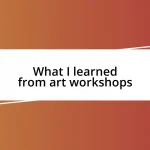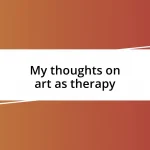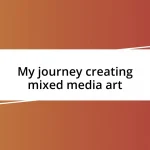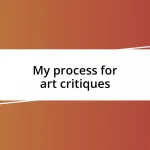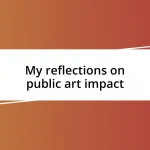Key takeaways:
- Poetry workshops foster a supportive community that encourages vulnerability and creative expression, enhancing connections among participants.
- Finding the right workshop involves assessing personal goals, the format of the sessions, and the instructor’s background to ensure alignment with one’s learning objectives.
- Receiving feedback in workshops is a valuable opportunity for growth; it allows poets to refine their work and gain new perspectives from fellow writers.

Introduction to Poetry Workshops
Poetry workshops have a unique way of unearthing the poet within each of us, regardless of our experience level. I still remember stepping into my first workshop, feeling a mix of excitement and trepidation. Would my words resonate with others, or would they sound foolish? The warm, welcoming atmosphere quickly alleviated my fears, showing me that vulnerability was part of the creative process.
As we shared our pieces and provided feedback, I realized that poetry is not just about the words we choose; it’s about connection. Each person’s story added a rich layer to the work we explored together. I often found myself moved by a simple line that someone else read aloud—moments like that remind us how deeply poetry can touch our souls.
In these workshops, I discovered that inspiration often blooms from collaboration. Engaging with fellow writers ignited my creativity in ways I never anticipated. Isn’t it fascinating how different perspectives can infuse fresh energy into our writing? That initial uncertainty transformed into a supportive community where every snippet of verse felt like a shared heartbeat.

Finding the Right Workshop
Finding the right poetry workshop can feel overwhelming, especially given the numerous options available. I remember sifting through countless listings, each promising a unique experience. What I learned is to reflect on what I wanted from the workshop—was it feedback, community, or perhaps a new technique? Figuring this out made it easier to weed through choices and find one that resonated with my goals.
Another key aspect I discovered is to consider the workshop’s format and structure. Some workshops are structured around writing prompts, while others focus more on refining and critiquing existing work. Based on my experience, I found that a blend of both was most beneficial. This approach fostered creativity while providing valuable insights into my writing’s strengths and weaknesses.
Lastly, it’s essential to assess the instructor’s background and style. Workshops led by experienced poets often provide rich learning opportunities. I remember my own thrill when my workshop leader shared their personal writing journey, offering insights that inspired me to dig deeper into my own work. Finding the right workshop means aligning your preferences with the style and philosophy of the instructor.
| Workshop Type | Key Features |
|---|---|
| In-Person | Live interaction, immediate feedback, community building |
| Online | Flexible timing, diverse geographical reach, recorded sessions |
| One-Time Intensive | Focused experience, deep dives into specific topics, rapid skill acquisition |
| Ongoing Series | Continual development, long-term relationships, progressive feedback |

Preparing for Your First Workshop
Preparing for your first poetry workshop can spark a whirlwind of emotions—excitement mingles with apprehension. I vividly recall a surge of nerves as I packed my notebook and a few of my fledgling poems. Remember, it’s normal to feel uncertain, but I quickly learned that bringing your authentic self to the table is what makes the experience transformative. Don’t overthink it; just be open to the journey ahead.
Here’s a checklist to help you prepare:
- Gather your materials: Bring a notebook, pens, and any poems you wish to share.
- Set personal goals: Think about what you hope to gain; whether it’s feedback, inspiration, or new friends.
- Familiarize yourself with the format: Understand if it’s a critique, prompt-based, or a mix—to feel more comfortable.
- Stay open-minded: Approach the workshop with a willingness to learn and grow.
- Find your voice: Remember, your unique perspective is what will enrich the group.
I still get butterflies thinking about that first day. The anticipation of sharing my work, the fear of judgment—all of it built up until I realized that everyone else was just as eager to connect. You’ll find that when others share their stories, it fosters trust and courage. You’re all there for one reason: to unleash creativity in a nurturing space. That’s the magic of workshops!

Engaging with Fellow Poets
Engaging with fellow poets during workshops opened up a world I hadn’t fully anticipated. I remember the first time I shared my lines and felt the room lean in, each nod of understanding boosting my confidence. It struck me how sharing our work creates a shared vulnerability that fosters deep connections. Don’t you think that kind of emotional exchange can elevate your writing and perspective?
Moreover, the discussions that arise after readings are often enlightening. I recall a moment when a fellow poet interpreted my work in a way I had never considered, revealing layers I buried deep beneath the surface. This exchange was not just about feedback; it was a collaborative exploration that made me rethink my own voice. Engaging in these dialogues pushes us to see our writing not just as isolated pieces but as part of a larger conversation.
What’s uniquely bonding is realizing that everyone comes from different backgrounds yet shares similar struggles. I found that a simple admission of insecurity about our craft could spark a powerful discussion. I often think: how often do we overlook the importance of community in nurturing our creative spirits? The warmth of those shared experiences creates an environment where we can all flourish together, and that’s truly invaluable.

Exploring Various Poetry Styles
Exploring various poetry styles during workshops has been like stepping into colorful realms of creativity. I remember the first time I encountered free verse; it was liberating to realize I didn’t have to adhere to strict forms or rhythms. The poems flowed more naturally, mirroring my own thoughts and emotions. Isn’t it fascinating how the lack of constraints can lead to such authentic expression?
Then there are structured forms like sonnets and haikus that challenge our precision and discipline. I distinctly recall my struggles with the rigid rhyme scheme of a sonnet; it felt claustrophobic at first. But with practice, I discovered that the challenge of selecting the perfect word within those constraints led to a deeper appreciation of language. Have you ever found joy in the process of restriction? It feels rewarding when your creativity dances gracefully within defined boundaries.
Another memorable experience was when we delved into the world of spoken word poetry. The energy in the room was palpable as each participant shared their pieces aloud, voices rising and falling like music. I felt invigorated by the raw emotion and urgency of the performance style. It made me wonder: how does the act of speaking our poetry aloud reshape the way we think about it? Engaging with different styles not only broadens our understanding but also enriches our own writing journey in unexpected ways.

Receiving Feedback and Critique
Receiving feedback and critique in poetry workshops can be intimidating at first. I vividly recall my nerves during a session when my poem was placed under the magnifying glass. The moment the first comment came, I held my breath, wondering if my vulnerable words would meet with kindness or harshness. Surprisingly, the constructive criticism felt like a warm embrace; it wasn’t about tearing me down, but rather guiding me to refine the beauty embedded in my work.
Sometimes, the most insightful feedback comes from unexpected places. I remember one session when a fellow poet pointed out a recurring theme in my work that I hadn’t even realized existed. Their observation opened my eyes, inspiring me to explore that theme further. It’s moments like these that make me appreciate the collective wisdom found within a group—each person brings a unique lens through which they view our shared art form. Have you ever had a moment where feedback shaped your work in ways you couldn’t have imagined?
Balancing between openness to critique and self-acceptance is a delicate dance. After receiving constructive comments, I’ve found it essential to pause and reflect. I ask myself: What resonates for me in this feedback, and what doesn’t? This self-dialogue has made me stronger as a poet. Feedback is not a definitive judgment but rather a tool for growth, helping me navigate the intricate path of my poetic journey. In the end, I realize that each critique is simply another stepping stone toward evolving my voice and style.



